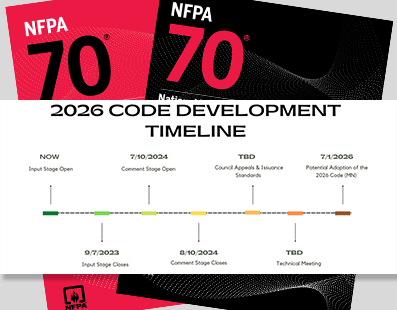
NEC Code Book
The History Behind It and How You Can Get Involved in Creating Code
To regulate installation standards and ensure quality, all of the trades operate with a set of standard codes. These codes are compiled in an industry code book, updated regularly, and upheld by industry inspectors…and the electrical industry is no exception.
First published in 1897, the National Electrical Code book, or NEC, was created by a group of insurance agents, electrical engineers, and building officials who were concerned about fires resulting from substandard electrical installations. Up to this point, newly installed electrical work was governed by available material and personal preferences, as opposed to cohesive safety standards. This led to arc flash burns, many electrocutions, and structural fires.
By 1911, the National Fire Protection Association, or NFPA, was formed and became the official sponsor of the NEC.
The NEC Code Book changes over time.
The electrical industry is continually evolving. New products are regularly introduced into the market and installed in residential and commercial buildings nationwide. At the same time, old processes are refined, and new installation methods emerge. In order to keep up with the changing landscape, officials update the electrical code every three years.
To apprentices entering the industry, the electrical code can seem daunting. There’s SO much to learn about the laws of electricity and intricate electrical theory, and the consequences of operating outside the code can be tragic. Apprentices learn early on that the National Electrical Code sets the stage for safe and effective electrical installations. When journey workers or master electricians take apprentices under their wings, they have the privilege of training them from the ground up, encouraging them as they develop their skills and learn the code.
Seasoned electricians continually advance their working knowledge of the code through on-the-job training and intensive study. Oftentimes, through the course of their fieldwork, they form opinions on how to modify the code for safety and effectiveness. If this is you, we encourage you to get involved in the code-making process! Take the initiative to collaborate with NFPA officials and propose the modification. Then, the NFPA Technical Committee reviews all public input. That which is deemed a possible cause to modify the code goes through numerous screenings, discussions, and debates across the country. If the proposal survives the scrutiny, it moves forward for final review. If your proposal is accepted, it will be added to the next edition of the NEC code book!
Are you a seasoned electrician interested in modifying the current electrical code?
Shortly after the latest NEC Code Book is published, the public input phase for the next edition begins. It’s a three-year process to gather and vote on modifications and draft each new edition. Here are some dates you can anticipate for the upcoming 2026 NEC Code Book:
- The First Draft Public Input Closing Date has passed, and the First Draft Report Posting Date is coming up on July 10, 2024.
- The Second Draft Public Comment Closing Date is August 28, 2024, and the Second Draft Report Posting Date is March 21, 2025.
- The Motions Committee Report (NITMAM, or Notice of Intent to Make a Motion) Closing Date is April 18, 2025, and the NITMAM Posting Date is May 16, 2025.
You can also view information from previous code-related meetings here! Select the “Next Edition” tab.
Remember, always show your electrical inspectors the respect they deserve!
As an electrical contractor, it’s easy to get stressed when deadlines are looming. Remember to maintain an atmosphere of respect towards your electrical inspector. After all, you’re on the same team! Inspectors ensure that jobs comply with the code. In some cases, inspectors catch careless mistakes by less experienced electricians and prevent catastrophic events that could result in injury or loss of life and damage your reputation. With electrical contractors on the scene, the bar remains high for safety and quality, and customers know they’re getting top-notch service at a competitive price.
If you’re interested in getting involved in the code-making process, click here! Follow the link to the NFPA site where you will find a host of information. If you don’t have an NFPA account, setting one up is easy!
The Electrical Association is your trusted resource for all things electrical in Minnesota and beyond. If you have additional questions about the code-making process for the NEC Code Book, we’d love to hear from you. Reach out to us at [email protected] or at (612) 827-6117.

If you’re not a member but are interested in joining the Electrical Association, learn more how to become a member. We look forward to being your partner in success!